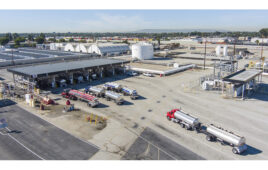Gasoline consumption will drop significantly in the coming decades while diesel consumption remains strong — find out what these trends mean for your business.
Where do you see your fuel operations heading in 10 years, 20 years — how about 32 years? That may seem like a long way out, but with the ever-changing transportation sector, forward-thinking convenience stores are looking that far ahead now.
And what they’re finding is the future of gasoline is uncertain. That may be putting it nicely. The U.S. Energy Information Administration (EIA) projects that motor gasoline consumption will decrease 31 percent between 2017 and 2050, according to its Annual Energy Outlook. Why? The main culprit is increasing fuel economy standards.
So how should you react? Think of it this way: What would a 31 percent drop in gasoline sales mean for your business? Also, what would it mean for your in-store sales if traffic at your pumps dropped by nearly one-third?
Your Pick: Steady Demand or Sharp Decline
One way retailers are responding is by adding diesel to their fuel lineup. Over that same 2017 to 2050 timeframe, the EIA projects diesel consumption to remain steady. Yes, diesel vehicles will also become more fuel efficient in the coming decades, but the EIA in the same report says there will also be rising demand for freight truck travel.
In addition to steady demand, offering diesel fuel can also help c-stores set themselves apart from the competition. That’s because only 55 percent of retail fuel sites in North America offer diesel, according to the Diesel Technology Forum.
Are you ready to step up and meet the demand for a product that 45 percent of your competitors are missing out on?
Additional Opportunities with Biodiesel
Many retailers tapping into the demand for diesel are also turning to biodiesel blends to give them an edge. CSD reported earlier this year that biodiesel interest is being driven by the desire to reduce greenhouse gas emissions, improve engine performance and, for retailers, to take advantage of the financial benefits.
Savvy retailers are attracting new fleet customers who want to use a more renewable fuel to enhance their sustainability. In fact, a new Fleet Purchasing Outlook study by NTEA, the Association for the Work Truck Industry, found that biodiesel was the most popular alternative fuel among fleets in 2018 and the top pick for future interest.
All of this adds up to opportunity for fuel retailers. With demand for diesel projected to remain strong for the next three decades, the fuel could offer a way to offset some of the losses from lower gasoline sales and keep people coming to your pumps — and inside your stores. And biodiesel can enhance those benefits even more.
To explore next steps, contact REG at (844) 405-0160. Learn more about REG at regi.com.




